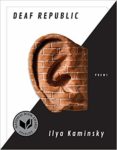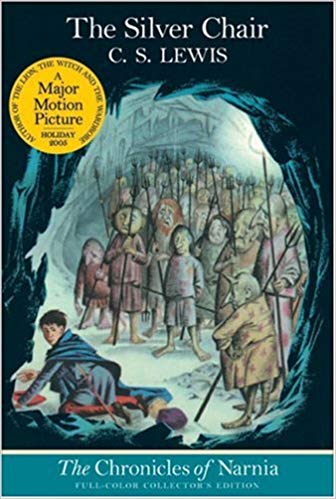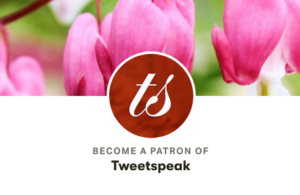And as elephants parade holding each elephant’s tail,
but if one wanders the circus won’t find the park,
I call it cruel and maybe the root of all cruelty
to know what occurs but not recognize the fact.
—William Stafford, A Ritual to Read to Each Other
If young Jill Pole were still back at Experiment House, the school where she was routinely bullied by her classmates, her entry in the yearbook might note that she was voted “Most Likely to Muff the Signs.”
In The Silver Chair by C.S. Lewis, the Signs are a big deal. There are four of them, and they appear very early in the story. After Jill and her companion Eustace Scrubb have escaped their nemeses at Experiment House by stumbling into the magical world of Narnia, and after she has tragically contributed to Eustace’s fall off an enormous cliff, and after she has had a good cry and a refreshing drink from a stream under the watchful eye of a dreadfully terrifying lion, that same terrifying lion assigned to her an impossible task. To aid in her improbable execution of the task (finding and rescuing the long lost Prince Rilian), he gave her four signs that would, if she remembered them, prove very useful along the way.
First; as soon as the Boy Eustace sets foot in Narnia, he will meet an old and dear friend. He must greet that friend at once; if he does, you will both have good help. [I should mention that before giving Jill the signs, the lion also saved Eustace and blew him on ahead on his breath.] Second; you must journey out of Narnia to the north till you come to the ruined city of the ancient giants. Third; you shall find a writing on a stone in that ruined city, and you must do what the writing tells you. Fourth; you will know the lost prince (if you find him) by this, that he will be the first person you have met in your travels who will ask you to do something in my name, in the name of Aslan.
Now, setting aside the obvious fact that the lion could have made things much simpler than this maybe deadly cross-country scavenger hunt—by telling Jill the name of the person Eustace needed to talk to, by giving them a map to the ruined city, by skipping the stone writing altogether and telling her what the writing said to do, by, oh, I don’t know, rescuing the prince himself—it’s really not as though the Signs were all that complicated. Greet a friend. Travel north to giant ruins. Do what the stone says. Save the guy who uses the name of Aslan. I imagine you have them memorized already, just like I do.
Friend. Ruins. Stone. Aslan.
Sorted.
Jill, however, did not have them memorized. And she did not find them to be without their complexities. She had to repeat the signs over and over (and have her recall corrected) until the lion was satisfied she could successfully carry the information forward. She could be forgiven thinking it was difficult. She’d just landed in a strange new world and nearly murdered her friend, after all. Her thoughts had to be a bit muddled by this point.
And so, rather than simplifying, the lion warned her, urgently, repeatedly:
But, first, remember, remember, remember the signs. Say them to yourself when you wake in the morning and when you lie down at night, and when you wake in the middle of the night. And whatever strange may happen to you, let nothing turn your mind from following the signs.
[…]
Remember the signs and believe the signs. Nothing else matters.
Jill was persuaded. During her flight—literally on air—across the great chasm, she worked them. Practiced them. Recited them. Until, that is, the air started getting a little thick as she approached the ground. Just like the lion said, it would become harder to keep them sorted. It would be easier to muff them.
And muff them she did. She met up with Eustace on the ground, they had an exchange of words, and because the signs were really not so simple as to be distilled into a list of four short words, and because, at least at the time of her arrival, only Jill knew them, they did not recognize the first sign was at that very moment sailing away on a great ship across the sea. By the time they realized King Caspian the Tenth, Eustace’s old (literally, though he didn’t see it then) friend, he was long gone and unable to be the good help Aslan said he would be.
‘Then the King was an old friend of yours!’ said Jill. A horrid thought had struck her.
‘I should jolly well think he was,’ said Scrubb miserably. ‘About as good a friend as a chap could have. And last time he was only a few years older than me. And to see that old man with a white beard, and to remember Caspian as he was the morning we captured the Lone Islands, or in the fight with the Sea Serpent—oh, it’s frightful. It’s worse than coming back and finding him dead.’
‘Oh, shut up,’ said Jill impatiently. ‘It’s far worse than you think. We’ve muffed the first Sign.’
So the two went on, bickering still, to have dinner with another old friend, though not the right old friend, and were later transported in the middle of the night by a “parliament of owls” who understood the important role they had to play in the daunting rescue of the king’s son, Prince Rilian. The owls set them up with the aptly-named Puddleglum, a tall amphibian-sort of creature known in Narnia as a Marsh-Wiggle and about whom one could say that pessimism springs eternal. Puddleglum proves over time, despite his certainty that they were doomed from the start, to be the key to the whole prince-rescue enterprise.
But before they could get on with the rescuing, they had to complete the journeying. To the North, according to the sign. North out of Narnia took them into a barren, cold wilderness for which they were ill prepared. Signs do little to provide warmth at night nor dry socks during the day. They traveled on, though, committed to their task. They eventually met up with a beautiful lady in green and her companion, a knight in all black with his face covered. The Lady of the Green Kirtle seemed kind and generous, and suggested they journey on to the city of the gentle giants and tell them that she sent them for the Autumn Feast.
A feast sounded quite lovely by then, and they plodded on dreaming of soft beds and deep sleep, hot food and hotter hearths. The journey was hard, cold and wet, and at one point Jill fell into a deep crevice in the rock which, when they all climbed down into it, seemed to go on like a maze. They eventually crawled out and, in time, made it to the giant city. Only later, after they’d arrived and been fed and clothed and coddled by the giants did they see from a window in the castle that on their journey they had gone right through the ruins without recognizing them and that the crevice they’d fallen into was more than a crack in the ground. From their high vantage point, they could see the ruins and could read carved in stone the words UNDER ME. They’d been crawling around in one of the Es, unaware it was a letter, let alone part of a word, let alone the third Sign. Muffed, again, right after the second.
All eyes were on Jill. In the dreaming of comfort and warmth, she had neglected the Signs. She had not remembered the Signs. She had not believed the Signs. She had permitted something else to matter. Three of four Signs, now muffed in spectacular fashion.
It leads me to wonder: Why was Jill, and only Jill, keeper of the Signs? They were no secret, the Signs. Eustace had heard her recite them. Puddleglum had heard her recite them. And oh, they remembered to exhort her to remember. But yet, rather than sharing the burden of actual remembering, they looked to Jill to remember alone. In their despair of the endless, impossible journey, they let go each other’s tail and wander in the cold, in the dark, and they fail to find their park.
In the giant’s castle, despite soft beds and warm food, they eventually made the horrifying discovery (by way of a giant pie crust that was just the right size for one of them to lie down in) that when the Lady of the Green Kirtle sent them to the gentle giants for the Autumn Feast, she didn’t mean for them to celebrate the Autumn Feast. She meant for them to be the autumn feast.
The three then planned and executed a daring escape from the giant’s castle. When they were spotted by giants returning from the day’s hunt, they were chased up a stony slope as they tried to cross back to the City Ruinous, and, rather by accident took refuge in what seemed to be a small cave. They enclosed themselves in the opening by piling rocks, and then sought to find their way out through the dark.
There in the dark passageway, also seemingly rather by accident, discovered the key to succeeding in their quest, a discovery that may turn out to be as critical than the Signs themselves. As they moved through the underground channels, unable to see even an inch in front of their faces, they held each other’s hands, eventually tumbling down and down and down, together, until they were deep inside the earth and discovered by an army of Earth Men who marched them further in until they reached the very knight they had earlier met on the road, above ground.
William Stafford suggests that while elephants parade together, each one holding another’s tail, they arrive safely at their destination. They help keep each other on the path. These moments underground, when none could see and the three had to rely on each other, step by excruciating step, they at last recognized the fact, and held each other’s tails, as it were, and for at least this one short piece of their impossible journey, they were not lost.
______
We’re reading The Silver Chair by C.S. Lewis together this month, juxtaposed with William Stafford’s poem A Ritual to Read to Each Other. Are you reading along? Share with us in the comments your thoughts on this middle section of the story.
____
Here’s a schedule for reading and discussing:
Week 1 (February 12): Chapters 1-5 – The Horrible Errors of Childhood
Week 2 (February 19): Chapters 6-10 – The Circus Won’t Find the Park

And be sure to join us starting March 11, when the poetry of Ilya Kaminsky in Deaf Republic will guide us in a reimagining of what it means to be a hero, of disability, of the movements that compel us to survive.
Our book club discussions are a patron perk. $5 patrons can opt to get each book club edition delivered in full straight to their inboxes, with a photo and link to the discussion!
Photo by a.canvas.of.light, Creative Commons license via Flickr. Post by Will Willingham.
- Earth Song Poem Featured on The Slowdown!—Birds in Home Depot - February 7, 2023
- The Rapping in the Attic—Happy Holidays Fun Video! - December 21, 2022
- Video: Earth Song: A Nature Poems Experience—Enchanting! - December 6, 2022



Megan Willome says
I’ve always loved Puddleglum, especially that he is both brave and a total pessimist. In most stories the brave are optimistic or inspiring or at least setting aside their fears for the Greater Good. Puddleglum gives us an example of the gloomiest Gus there ever was, and yet he always does the brave thing.
Jennifer Strange says
I’ve been realizing upon this re-reading that Eustace Still has a great deal of fear in him; while he is not consumed by anger like before his un-dragoning, he is not done with fearfulness. And Jill is as well, though she expresses it differently. One of the wonderful things about Puddleglum is that he is also very scared . . . but he knows this about himself, and can therefore move forward when needed with courage.
Will Willingham says
Oh, such a good thought on this. I’d not looked at it all specifically as how they each respond to fear, but gosh, why wouldn’t it be? The whole thing they have in front of them is terrifying.
Will Willingham says
Sometimes I think the whole point Aslan had in bringing Eustace and Jill over from our world was to give Puddleglum the chance to be the hero.
Rebecca D Martin says
What a great thought. When I was reading this section this evening to my nine-year-old (getting it in just before tomorrow’s new post!), we talked about how Puddleglum is both a total Eeyore, and thus very wrong in his assessment of terrible things that are certain to happen (but won’t), and also a wise guide. He knows they should be looking for the signs; he suspects the maze they climb through has something to do with them. And my! is he brave.
I also bear from my childhood the strongest memory of laughter at the “respectobibble!” I didn’t get quite that far with my daughter before her bedtime; tomorrow, I’ll be reading and, I’m sure, explaining to her about drunkenness. THAT’ll be fun.
I, also, was troubled that the group allows Jill to be the sole bearer of the signs, and I love how perfectly that dovetails with Stafford’s wandering elephants. And how you tie it in with their holding on to each other in the dark. It takes them that absolute level of inability and need to see that they need each other for this task, and have all along.
Another flash from childhood readings: back then, the discomfort I felt when they were in the giants’ castle, and the incredible tension of fear I felt when they were sneaking out and on the run from the giants, loomed so large in my memory that I misremembered, and thought those two events took up just chapters and chapters of the book. My surprise, now, to find that it’s a mere two chapters! I still felt the anxiety, though – maybe even worse.
This is so fun. Thanks for taking us along!
L.L. Barkat says
I love, love, love this summary and subtle unfolding of The Silver Chair. Thank you. (I feel like I want to read and reread it, maybe for a month or so. 🙂 )
I think that, in a group, we often make a critical mistake, and this little band makes it in two forms, and you’ve discussed it, but I want to pull it upward here for myself in this moment:
• to think that only one person, or one type of person, is important to the mission (the mistake of letting Jill be “the only one” to carry the Signs)
• to think that only one person, or one type of person, is important to the mission (the mistake of considering Puddleglum’s pessimism as unfit for the courageous task ahead)
And so we count on too few people to be the hero. And so we miss our best heroes, too.
This story would be so perfect for all Americans to read right now. It’s really hard to see where the “Other” has a point, or is essential to the mission, when they are so different from us or when we want to just hand over responsibility to someone who seems like “it’s their job, not mine.” Maybe where we get muddled is in understanding our mission? I was reading in Krista Tippett’s book on wisdom… one of her interviewees said he thought it was time for America to consider the question: “What are we for?”
It’s easy to think that we are just for the comfortable bed, the simple journey, the autumn feast. It’s hard to remember that that kind of thinking can make us be, ultimately, the autumn feast, for the “giants” that wish to do us harm, whatever those might be. I love our American individualism, but I see where it is also absolutely something that gets in our journeying way.
Will Willingham says
It’s true. Puddleglum was seen as a guide, but they were the ones to do the rescuing. Eustace with his sword, Jill with her Signs (and, okay, a dagger). And as Megan has noted as well, it’s Puddleglum whose heroics really end up saving the day.
How we see, define, interpret — it’s so important. Staying open, curious, willing to see — that is everything some days, I think.
Rebecca D Martin says
Yes! to this assessment. You’ve reminded me of Marilynne Robinson. Doesn’t she have an essay collection called “What Are People For?” – or at least an essay. And she’s all about seeing – really seeing – others with a ready generosity. Not wandering because we’re in this together, hand-in-hand. And because we’re looking at each other to really see.
Rebecca D Martin says
Well, I got it wrong. Robinson’s collection is “What Are We Doing Here?” I think it’s Wendell Berry who’s got a book, “What Are People For?”
My misremembering (ha! Good thing I’m not in charge of any signs!) got me in the right direction, though. I think Robinson’s a better fit here than Berry.